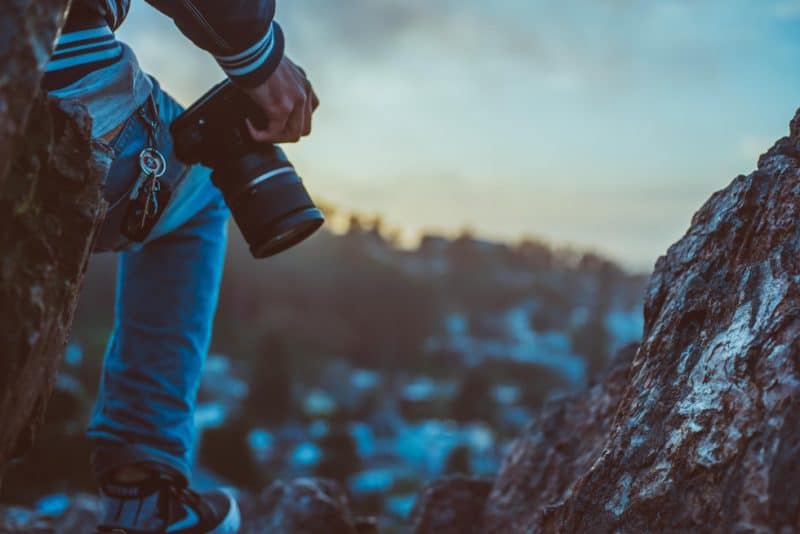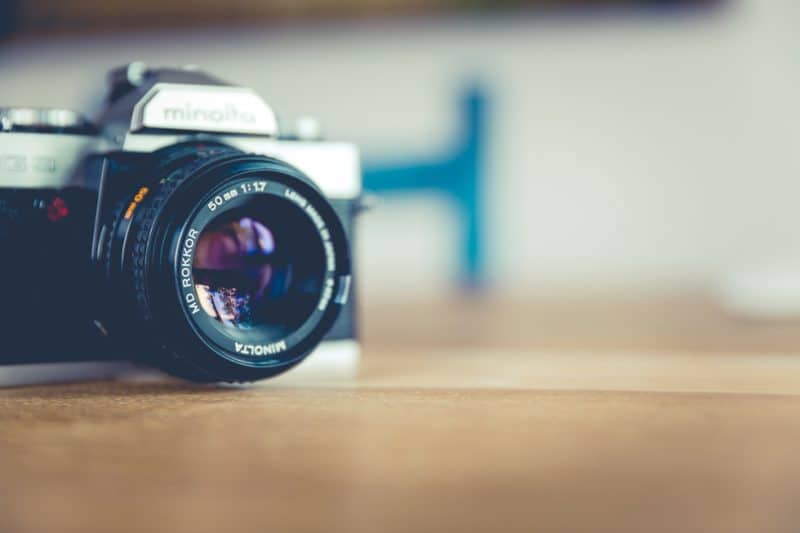Can You Use A Crop Sensor Lens On A Full Frame Camera
The one thousand thousand dollar question! Do I demand a full frame photographic camera?
Whether yous are a beginner getting ready to purchase your first DSLR, or a avant-garde photographer considering if you demand to upgrade your camera, at some point y'all may find yourself scratching your head and wondering: crop vs full frame, which photographic camera practice I demand?
Ingather vs Full Frame: What is the difference anyway?
The actual difference betwixt full frame and crop sensor is the actual, physical, sensor size. That sensor lives inside the total frame sensor camera. The sensor size is actually the same size as a frame of traditional 35mm movie. A full frame sensor will also requite y'all a shallower depth of field.
This is why full frame sensor cameras were a must have for anyone coming over to digital from shooting with movie for years. In terms of field of view, when looking through the viewfinder, you'd get a similar "feel" between a full frame DSLR and a 35mm film SLR.

A crop sensor photographic camera, every bit the name implies, refers to whatsoever sensor smaller than the 35mm film frame. Ingather sensors accept a sensor smaller than its total frame sensor counterpart or "cropped" sensor. The nigh noticeable impact associated with this is what is chosen a "ingather gene."
In a crop sensor, the crop factor refers to the magnification of field of view when looking through the viewfinder. Only call up crop sensors too touch depth of field. For virtually APS C and crop sensors DSLRs, the ingather factor is 1.5 or 1.half dozen, so for easy math, let's employ 1.v every bit the crop gene.
[advertizing id='five′]
A Crop Factor Example:
A 50mm lens on a full frame sensor camera will take a field of view of 50mm with a shallow depth of field. A 50mm lens on a crop sensor camera has a field of view of roughly 75mm (50mm lens x 1.5 crop factor = 75mm). So in elementary terms, your 50mm lens will "experience and act" like a 75mm lens on a crop sensor photographic camera.
Along with having a similar "experience" to 35mm moving picture camera lens, full frame sensor DSLRs have an advantage at shooting in low light conditions. There larger sensor size allows for larger photosites on the sensor which allows for improved performance at high ISO ranges. Full frame DSLRs with large sensor size will just about always outperform a crop sensor camera in low lite atmospheric condition.

For our very best beginner photography tutorials click hither.
Technological Advances Affair!
Up until the last few years, if you were a professional or serious hobbyist photographer, having full frame cameras was a must. The lens and focal length choices available for ingather sensor cameras weren't as vast equally the full frame sensors and focal length choices and the ISO, focal length and paradigm quality functioning just wasn't at the level of full frame cameras for whatever serious photographer.
Heck, even my first DSLR (a Nikon D40) was a lousy camera in terms of ISO at anything over 800 or then. Each year we are seeing cameras getting better and ameliorate in terms of ISO, focal length, and image quality.
The newest Nikon full frame camera is now able to use ISO 408,600 and the Nikon D7100 crop sensor camera has an ISO range up to 6400 now!
Not merely have crop sensor cameras greatly caught up to full frame sensors and closed the gap between full frame and crop cameras in terms of ISO and focal length performance but besides in image quality, autofocus accuracy and fifty-fifty other "bonus" features too (video, alive view, etc…).

So Which Camera Do Yous Need?
And then at present that we know what the primary deviation is between full frame vs ingather cameras, and we've seen how far crop sensor cameras take come in terms of capability and performance in relation to the full frame sensors cameras, which camera do yous need?
When you have to decide which photographic camera do y'all demand, whether total frame vs crop sensor, I want you to ask yourself these iv questions:
1. Am I a paid photographer or but a hobbyist photographer?
2. What kind of photography do I shoot?
3. What aspects of my current camera are limiting me?
4. What is my budget?
Let's go through the questions above to determine if you need full frame cameras or crop sensor. If you are just someone who loves photography just isn't being hired for any photoshoots, then you can only jump to question #iv and let your ain budget determine what camera to become, full frame vs crop sensor.
If you are a paid photographer though, and so you have to consider question #2 next…

What Kind of Photography Exercise I Shoot?
If you are a wedding ceremony lensman things may get tricky. Are y'all are consistently having to shoot in agin low-light weather out of your control (like church building ceremonies, without flash)? If so, then y'all know that y'all need smashing high ISO functioning.
In this instance, a total-frame camera with high ISO functioning tin certainly help you lot practise your job amend, with meliorate results. Do you Demand a full frame DSLR camera? Today, probably non. V years agone, yes.
If you are a newborn photographer, where you are setting upward the photo shoots on location or in a studio and your bailiwick is pretty stationary? And so potentially a loftier ISO and focal length performance won't be much of a concern for you lot compared to the nuptials photographer. Do you need a total frame DSLR camera? No.
If you lot are a sports or wildlife lensman you might really prefer a crop sensor camera instead of a total frame sensors camera considering the "crop gene." It will help give you lot a narrower field of view! Your 200mm lens will feel like a 300mm lens on a full frame!
[advert id='3′]
What Aspects of My Current Camera are Limiting Me?
To continue on with our wedding photography example, allow's say you lot are currently using the latest Catechism ingather sensor camera. It has nifty functioning overall, but at ISO 2500 it starts to get really, actually grainy.
In this case, you lot actually need to exist able to shoot make clean images at ISO 5000. If this is a limitation that is affecting your work (and ultimately your clients' images), you may demand to consider upgrading from a ingather sensor to a full frame camera.
Let's say your using an old D40 Nikon and considering an upgrade to a full frame body. You lot feel the 3-point autofocus isn't sufficient enough to capture your fast-moving children.
Maybe you want more than 6 megapixels because you LOVE to make very large prints upwardly to 20×thirty in size; and its ISO and focal length operation is pretty dour besides. For you, I'd say you too are limited and prepare for an upgrade. All the same, many of the newer ingather sensor cameras would be very suitable upgrades and at that place isn't a "need" to step upward to full frame DSLR.
What is my budget?
Ultimately, upkeep is what will play a significant role in your decision betwixt a full frame and ingather sensor camera. The cheapest full frame trunk cameras are currently sitting around $two,000 and up to $6500 for merely the camera frame body. This is compared to crop sensor cameras in the $500-$1200 range. Professional lenses for full frame cameras are also pricier than about lenses designed for crop sensor cameras, and so make certain to take that into business relationship as well.
It is an investment, but based on your answers to the questions above, you'll know if y'all need a full frame cameras, or not.
In Endmost
The most important thing to always retrieve is, Yous as the lensman are more important than any piece of gear you can buy. Ever focus on improving your exposure and technical skills, your limerick, your posing skills, etc… those are the elements that will let for great photographs and you tin can have them with you from camera to camera!
Source: https://www.colesclassroom.com/crop-vs-full-frame-camera-need/
Posted by: monsourguideare.blogspot.com


0 Response to "Can You Use A Crop Sensor Lens On A Full Frame Camera"
Post a Comment